|
Best Film Speeches and Monologues
|
|
Title Screen
|
Film Title/Year and Description of Film Speech/Monologue |
Screenshots
|
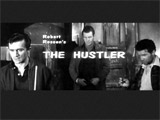
|
The
Hustler (1961)
Screenwriter(s): Sidney Carroll, Robert
Rossen
 "Like
All of a Sudden, I Got Oil in my Arm. Pool Cue's Part of Me" "Like
All of a Sudden, I Got Oil in my Arm. Pool Cue's Part of Me"
During a picnic, Fast Eddie's description to his
girlfriend Sarah Packard (Piper Laurie) of the beautiful thrill
of shooting pool. He compared it to a jockey riding a horse -
for once glorifying the game devoid of the harsh, dehumanizing,
'win-or-lose' mentality of competition:
When I'm goin', when I'm really goin', I feel like
a, like a jockey must feel when he's sittin' on his horse, he's
got all that speed and that power underneath him, he's coming
into the stretch, the pressure's on him - and he knows. He just
feels, when to let it go and how much. 'Cause he's got everything
workin' for him - timing, touch. It's a great feeling, boy -
it's a real great feeling when you're right and you know you're
right. Like all of a sudden, I got oil in my arm. Pool cue's
part of me. You know, it's a - pool cue, it's got nerves in it.
It's a piece of wood; it's got nerves in it. You can feel the
roll of those balls. You don't have to look. You just know. You
make shots that nobody's ever made before. And you play that
game the way nobody's ever played it before.
After his monologue, Sarah confidently stated her
belief in him as a "winner"
- and her love:
You're not a loser, Eddie. You're a winner. Some
men never get to feel that way about anything. I love you,
Eddie.
She fell in love with him and could redeem him
from his losing battles, but being self-absorbed and emotionally
crippled, he was unable to respond and commit:
Eddie: You know, someday Sarah, you're gonna
settle down. You're gonna marry a college professor. You're
gonna write a great book - maybe about me, huh? Fast Eddie
Felson, Hustler.
Sarah: I love you.
Eddie: Do you need the words?
Sarah: Yes, I need them very much. If you ever say them, I'll
never let you take them back.
|
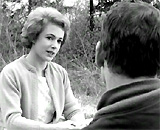
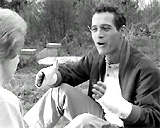
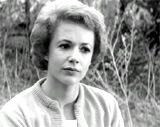
|

|
The
Hustler (1961)
Screenwriter(s): Sidney Carroll, Robert Rossen
 "You
Don't Know What Winning Is" "You
Don't Know What Winning Is"
After winning the ultimate returning pool match
with Minnesota Fats (Jackie Gleason), hotshot pool player "Fast" Eddie
Felson (Paul Newman) indicted himself and his greedy manager/promoter
Bert Gordon (George C. Scott) for being inhumane and driving
girlfriend Sarah Packard (Piper Laurie) to suicide:
We really stuck the knife in her, didn't
we, Bert?...Boy, we really gave it to her good....Then
we twisted it, didn't we, Bert? Of course, maybe that doesn't
stick in your throat, 'cause you spit it out just the way
you spit out everything else. But it sticks in mine. I
loved her, Bert. I traded her in on a pool game. But that
wouldn't mean anything to you because who did you ever
care about. 'Just win,' 'Win!' you said, 'win, that's
the important thing.' You don't know what winning is, Bert.
You're a loser. 'Cause you're dead inside and ya can't
live unless you make everything dead around ya! Too high,
Bert - the price is too high. If I take it, she never lived.
She never died. And we both know that's not true, Bert,
don't we, huh? She lived, she died. Boy, you better, you
tell your boys they better kill me, Bert. They better go
all the way with me, but if they just bust me up, I'll
put all those pieces back together again, then so help
me, so help me God, Bert, I'm gonna come back here and
I'm gonna kill you.
|

|
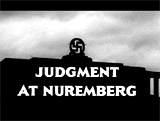
|
Judgment
at Nuremberg (1961)
Screenwriter(s): Abby Mann
 "I
Am Going to Tell Them the Truth" Confessional Speech "I
Am Going to Tell Them the Truth" Confessional Speech
Play clip (excerpt): 
German's Ministry of Justice judge Dr. Ernst
Janning (Burt Lancaster) delivered a brave, lengthy confession
of his and every German citizen's Nazi War Crimes guilt during
his 1948 hearing, to the protests of his own counsel Hans Rolfe
(Maximilian Schell) who interrupted, claiming that Janning
wasn't aware of the implications of his words:
I wish to testify about the Feldenstein case
because it was the most significant trial of the period.
It is important not only for the tribunal to understand
it, but for the whole German people. But in order to understand
it, one must understand the period in which it happened.
There was a fever over the land, a fever of
disgrace, of indignity, of hunger. We had a democracy, yes,
but it was torn by elements within. Above all, there was
fear, fear of today, fear of tomorrow, fear of our neighbors,
and fear of ourselves. Only when you understand that can
you understand what Hitler meant to us, because he said to
us: 'Lift your heads! Be proud to be German! There are devils
among us, communists, liberals, Jews, gypsies. Once these
devils will be destroyed, your misery will be destroyed.'
It was the old, old story of the sacrificial lamb.
What about those of us who knew better, we
who knew the words were lies and worse than lies? Why did
we sit silent? Why did we take part? Because we loved our
country. What difference does it make if a few political
extremists lose their rights? What difference does it make
if a few racial minorities lose their rights? It is only
a passing phase. It is only a stage we are going through.
It will be discarded sooner or later. Hitler himself will
be discarded - sooner or later. 'The country is in danger.'
We will 'march out of the shadows!' We will 'go forward.' Forward is
the great password.
And history tells how well we succeeded, Your
Honor. We succeeded beyond our wildest dreams. The very elements
of hate and power about Hitler that mesmerized Germany, mesmerized
the world! We found ourselves with sudden powerful allies.
Things that had been denied to us as a democracy were open
to us now. The world said, 'Go ahead. Take it. Take it! Take
Sudetenland! Take the Rhineland! Re-militarize it! Take all
of Austria! Take it!'
And then one day, we looked around and found
that we were in an even more terrible danger. The ritual
begun in this courtroom swept over the land like a raging,
roaring disease. What was going to be a 'passing phase' had
become the way of life.
Your Honor, I was content to sit silent during
this trial. I was content to tend my roses. I was even content
to let counsel try to save my name. Until I realized that
in order to save it, he would have to raise the specter again.
You have seen him do it. He has done it here in this courtroom.
He has suggested that the Third Reich worked for the benefit
of people. He has suggested that we sterilized men for the
welfare of the country. He has suggested that perhaps the
old Jew did sleep with the 16 year-old girl after all. Once
more, it is being done for love of country. It is not easy
to tell the truth. But if there is to be any salvation for
Germany, we who know our guilt must admit it, whatever the
pain and humiliation.
I had reached my verdict on the Feldenstein
case before I ever came into the courtroom. I would have
found him guilty, whatever the evidence. It was not a trial
at all. It was a sacrificial ritual in which Feldenstein,
the Jew, was the helpless victim....I am aware. I am aware!
My counsel would have you believe we were not aware
of the concentration camps. Not aware? Where were
we? Where were we when Hitler began shrieking his hate in
Reichstag? Where were we when our neighbors were being dragged
out in the middle of the night to Dachau?! Where were we
when every village in Germany has a railroad terminal where
cattle cars were filled with children being carried out to
their extermination! Where were we when they cried out in
the night to us. Were we deaf, dumb, blind?....
My counsel says we were not aware of the extermination
of the millions. He would give you the excuse we were only
aware of the extermination of the hundreds. Does that make
us any the less guilty? Maybe we didn't know the details.
But if we didn't know, it was because we didn't want to
know...
I am going to tell them the truth. I am going
to tell them the truth if the whole world conspires against
it. I am going to tell them the truth about their Ministry
of Justice. Werner Lammpe, an old man who cries into his
Bible now, an old man who profited by the property expropriation
of every man he sent to a concentration camp. Friedrich Hofstetter,
the 'good German' who knew how to take orders, who sent men
before him to be sterilized like so many digits. Emil Hahn,
the decayed, corrupt bigot obsessed by the evil within himself.
And Ernst Janning, worse than any of them because
he knew what they were, and he went along with them. Ernst
Janning - who made his life excrement, because he walked
with them!
|
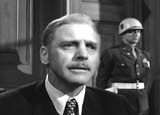
|

|
Judgment
at Nuremberg (1961)
Screenwriter(s): Abby Mann
 Defense
Counsel Rolfe's Final Desperate Closing Statement for His
Client Defense
Counsel Rolfe's Final Desperate Closing Statement for His
Client
Counsel Hans Rolfe (Maximilian Schell) spoke
on his client Ernst Janning's (Burt Lancaster) behalf, arguing
that
"Ernst Janning's guilt is the world's guilt":
Your Honor. It is my duty to defend Ernst
Janning. And yet, Ernst Janning has said he is guilty.
There's no doubt, he feels his guilt. He made a great error
in going along with the Nazi movement, hoping it would
be good for his country. But, if he is to be found guilty,
there are others who also went along, who also must be
found guilty. Ernst Janning said, 'We succeeded beyond
our wildest dreams.' Why did we succeed, Your Honor? What
about the rest of the world? Did it not know the intentions
of the Third Reich? Did it not hear the words of Hitler's
broadcast all over the world? Did it not read his intentions
in Mein Kampf, published in every corner of the
world?
Where's the responsibility of the Soviet Union,
who signed in 1939 the pact with Hitler, enabled him to make
war? Are we now to find Russia guilty? Where's the responsibility
of the Vatican, who signed in 1933 the Concordat with Hitler,
giving him his first tremendous prestige? Are we now to find
the Vatican guilty?
Where's the responsibility of the world leader,
Winston Churchill, who said in an open letter to the London
Times in 1938 - 1938, Your Honor! 'Were England to suffer
national disaster, I should pray to God to send a man of
the strength of mind and will of an Adolf Hitler!' Are we
now to find Winston Churchill guilty? Where is the responsibility
of those American industrialists, who helped Hitler to rebuild
his armaments and profited by that rebuilding?!! Are we now
to find the American industrialists guilty? No,
Your Honor. No! Germany alone is not guilty: The whole world
is as responsible for Hitler's Germany.
It is an easy thing to condemn one man in
the dock. It is easy to condemn the German people to speak
of the 'basic flaw' in the German character that allowed
Hitler to rise to power - and at the same time positively
ignore the 'basic flaw' of character that made the Russians
sign pacts with him, Winston Churchill praise him, American
industrialists profit by him!!
Ernst Janning said he is guilty. If he is,
Ernst Janning's guilt is the world's guilt. No more and no
less.
|
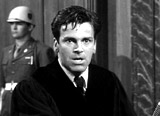
|

|
Judgment
at Nuremberg (1961)
Screenwriter(s): Abby Mann
 Judge's
Delivery of Janning's Sentence by the Court Judge's
Delivery of Janning's Sentence by the Court
Play clip (excerpt): 
Retired American Judge Dan Haywood (Spencer Tracy)
sentenced Dr. Ernst Janning (Burt Lancaster) in the 1948 American
court established in Nuremberg, ordering the accused to life
imprisonment:
The trial conducted before this Tribunal
began over eight months ago. The record of evidence is
more than 10,000 pages long, and final arguments of counsel
have been concluded. Simple murders and atrocities do not
constitute the gravamen of the charges in this indictment.
Rather, the charge is that of conscious participation in
a nationwide, government organized system of cruelty and
injustice - in violation of every moral and legal principle
known to all civilized nations.
The Tribunal has carefully studied the record
and found therein abundant evidence to support, beyond a
reasonable doubt, the charges against these defendants. Herr
Rolfe, in his very skillful defense, has asserted that there
are others who must share the ultimate responsibility for
what happened here in Germany. There is truth in this. The
real complaining party at the bar in this courtroom is civilization.
But the Tribunal does say that the men in the dock are responsible
for their actions. Men who sat in black robes in judgment
on other men. Men who took part in the enactment of laws
and decrees, the purpose of which was the extermination of
humans beings. Men, who in executive positions, actively
participated in the enforcement of these laws - illegal even
under German law. The principle of criminal law in every
civilized society has this in common: any person who sways
another to commit murder, any person who furnishes the lethal
weapon for the purpose of the crime, any person who is an
accessory to the crime - is guilty. Herr Rolfe further asserts
that the defendant Janning was an extraordinary jurist and
acted in what he thought was the best interest of his country.
There is truth in this also.
Janning, to be sure, is a tragic figure. We
believe he loathed the evil he did. But compassion for the
present torture of his soul must not beget forgetfulness
of the torture and the death of millions by the government
of which he was a part. Janning's record and his fate illuminate
the most shattering truth that has emerged from this trial.
If he and all of the other defendants had been degraded perverts,
if all of the leaders of the Third Reich had been sadistic
monsters and maniacs, then these events would have no more
moral significance than an earthquake, or any other natural
catastrophe. But this trial has shown that under a national
crisis, ordinary, even able and extraordinary men, can delude
themselves into the commission of crimes so vast and heinous
that they beggar the imagination. No one who has sat through
the trial can ever forget them. Men sterilized because of
political belief. A mockery made of friendship and faith.
The murder of children. How easily it can happen.
There are those in our own country too who
today speak of the 'protection of country,' of 'survival'.
A decision must be made in the life of every nation at the
very moment when the grasp of the enemy is at its throat.
Then, it seems that the only way to survive is to use the
means of the enemy, to rest survival upon what is expedient,
to look the other way. Well, the answer to that is 'survival
as what'? A country isn't a rock. It's not an extension of
one's self. It's what it stands for. It's what it stands
for when standing for something is the most difficult!
Before the people of the world, let it now be noted that
here, in our decision, this is what we stand for: Justice,
truth, and the value of a single human being.
|
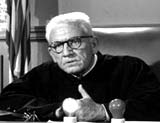
|

|
West Side Story (1961)
Screenwriter(s): Ernest Lehman
 Farewell
To A Slain Lover Farewell
To A Slain Lover
Maria's (Natalie Wood) anguished ranting at gang
members, protecting slain lover Tony's (Richard Beymer) body
on the ground:
Stay back!... How do you fire this gun, Chino?
By pulling this little trigger?! How many bullets are left,
Chino? Enough for you? Or you?
All of you! You all killed
him! And my brother! And Riff! Not with bullets and knives!
With HATE! Well, I can kill now too, because now I have
hate! How many can I kill, Chino? How many -- and still
have one bullet left for me? Don't touch him!
Afterwards, she said her
farewell to Tony: "Te adoro, Anton."
|
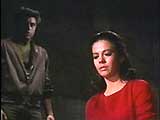
|
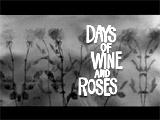
|
Days
of Wine and Roses (1962)
Screenwriter(s): J.P. Miller
 Offer
of Reconciliation Offer
of Reconciliation
Boozer Joe Clay's (Jack Lemmon) powerful admission
and offer of reconciliation to his wife Kirsten (Lee Remick):
You and me and booze - a threesome. You and
I were a couple of drunks on the sea of booze, and the
boat sank. I got hold of something that kept me from going
under, and I'm not going to let go of it. Not for you.
Not for anyone. If you want to grab on, grab on. But there's
just room for you and me - no threesome.
|
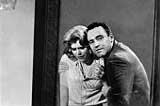
|

|
Gypsy (1962)
Screenwriter(s): Leonard Spigelgass
 "I
AM Gypsy Rose Lee!" "I
AM Gypsy Rose Lee!"
Louise Hovick/Gypsy Rose Lee's (Natalie Wood)
confrontational telling off of her overbearing stage mother
Mama Rose Hovick (Rosalind Russell):
Nobody laughs at me! Because I laugh first
-- at ME! ME, from Seattle! ME, with no education! ME,
with no talent, as you kept reminding me my whole life!
Well, Mama, look at me now! I'm a STAR! Look! Look how
I live! Look at my friends! Look where I'm going! I'm not
staying in burlesque! I'm moving! Maybe up, maybe down!
But wherever it is, I'm enjoying it! I'm having the time
of my life, because for the first time, it IS my life!
And I LOVE it! I love every second of it, and I'll be DAMNED
if you're gonna take it away from me! I AM GYPSY ROSE LEE,
and I love her! And if you don't, you can just clear out
now!
|

|

|
Gypsy (1962)
Screenwriter(s): Leonard Spigelgass
 "I
Made You" Revelation "I
Made You" Revelation
The bitter on-stage cursing soliloquy by Mama
Rose Hovick (Rosalind Russell) about her untalented daughter
Louise ("Gypsy
Rose Lee") Hovick (Natalie Wood) after Gypsy's outburst
backstage. She explained how she had forced her daughters onto
the vaudeville stage to live out her own dreams of stardom,
expressing all her own heartbreak and defiance:
(repeating Louise's words) 'I thought
you did it for me, Mama. I thought you did it for me,
Mama'. I thought you made a no-talent ox into a star
because you like doin' things the hard way, Mama.'
(Mama Rose)
And you have
no talents. Not what I call talent, Miss Gypsy Rose Lee!
I made you. I made you! And you wanna know why? You
wanna know what I did it for? 'Cause I was born too soon
and started too late, that's why. What I got in me. I
could've been better than ANY of you! What I got in me,
what I've been holdin' down inside of me, if I ever
let it go, there wouldn't have been signs BIG enough.
There wouldn't have been lights BRIGHT enough! Here
she is, boys. Here she is, world. Here's Rose! 'Curtain Up', 'Light
the Lights', 'Play it, boys.' You either got it, or you ain't, and
boys, I got it"
She then launched into her famous sung/spoken
number: "Everything's Coming Up Roses."
|
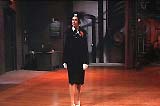
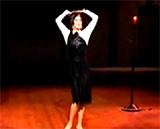
|

|
Ride the High Country (1962)
 Wistful
Marriage Ceremony Speech Wistful
Marriage Ceremony Speech
In this revisionistic western classic by director
Sam Peckinpah - considered the first modern western, drunken
old Judge Tolliver (Edgar Buchanan) officiated in a wedding ceremony
performed in a squalid brothel (Kate's Place) run by madam-bridesmaid
Kate (Jenie Jackson) with her prostitutes as flower-girls (Sam,
Rose, Belle, and Candy). Innocent and sheltered farmgirl Elsa
Knudsen (Mariette Hartley), wearing her mother's wedding dress,
was surrounded by an assortment of rough, degenerate and drunken
miners. She was marrying her fiancee, a white-trash miner at
the Coarsegold mining camp named Billy Hammond (James Drury),
and was advised by Kate to have a drink before the "formalities."
Tolliver quietly and unexpectedly delivered a
short but surprisingly wise, profound and affecting speech about
the meaning and sanctity of a true marriage:
We're gathered here in the high mountains, in
the presence of this august company, to join this man and this
woman in matrimony.
Now, I'm -
I'm not a man of the cloth and this is not a religious ceremony.
It's a civil marriage, but it's not to be entered into unadvisedly,
but reverently and soberly. A good marriage has a kind of a simple
glory about it. A good marriage is, is like a rare animal, it's
hard to find, it's almost impossible to keep!
You see, people
change, and that, that's important for you to know at the
beginning - people change! The glory of a good marriage don't
come at the beginning - it comes later on - and it's hard work!
|
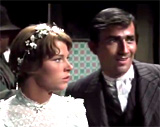
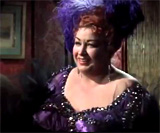
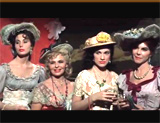

|
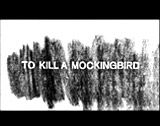
|
To
Kill a Mockingbird (1962)
Screenwriter(s): Horton Foote
 Closing
Court Argument at the Robinson Rape Trial Closing
Court Argument at the Robinson Rape Trial

Play clip (excerpt): 
Lawyer Atticus Finch (Gregory Peck) made a convincing
closing argument to the jury, imploring them to acquit his
falsely-accused black client, Tom Robinson (Brock Peters):
To begin with, this case should never have
come to trial. The State has not produced one iota of medical
evidence that the crime Tom Robinson is charged with ever
took place. It has relied instead upon the testimony of
two witnesses whose evidence has not only been called into
serious question on cross examination, but has been flatly
contradicted by the defendant. Now there is circumstantial
evidence to indicate that Mayella Ewell was beaten savagely
by someone who led, almost exclusively, with his left [hand].
And Tom Robinson now sits before you, having taken 'The
Oath' with the only good hand he possesses - his right.
I have nothing but pity in my heart for the chief witness
for the State. She is the victim of cruel poverty and ignorance,
but my pity does not extend so far as to her putting a
man's life at stake, which she has done in an effort to
get rid of her own guilt. Now I say guilt, gentlemen,
because it was guilt that motivated her. She has
committed no crime. She has merely broken a rigid and time-honored
code of our society, a code so severe that whoever breaks
it is hounded from our midst as unfit to live with. She
must destroy the evidence of her offense.
But what was the evidence of her offense? Tom
Robinson - a human being. She must put Tom Robinson away
from her. (He gestured, pushing away with his hands)
Tom Robinson was to her a daily reminder of what she did.
Now what did she do? She tempted a Negro. She was white and
she tempted a Negro. She did something that in our society
is unspeakable. She kissed a black man. Not an old uncle,
but a strong, young Negro man. No code mattered to her before
she broke it, but it came crashing down on her afterwards.
The witnesses for the State, with the exception of the sheriff
of Lincoln County, have presented themselves to you gentlemen,
to this court, in the cynical confidence that their testimony
would not be doubted, confident that you gentlemen would
go along with them on the assumption - the evil assumption
- that all Negroes lie. All Negroes are basically immoral
beings. All Negro men are not to be trusted around our women,
an assumption that one associates with minds of their caliber,
and which is in itself, gentlemen, a lie - which I do not
need to point out to you.
And so, a quiet, humble, respectable Negro,
who has had the unmitigated temerity to feel sorry
for a white woman, has had to put his word against two white
peoples. The defendant is not guilty. But somebody
in this courtroom is. Now gentlemen, in this country, our
courts are the great levelers. In our courts, all men are
created equal. I'm no idealist to believe firmly
in the integrity of our courts and of our jury system. That's
no ideal to me. That is a living, working reality. Now I
am confident that you gentlemen will review - without passion
- the evidence that you have heard, come to a decision, and
restore this man to his family. In the name of God, do your
duty. In the name of God, believe Tom Robinson.
|
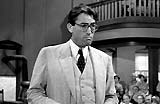
|

|
To
Kill a Mockingbird (1962)
Screenwriter(s): Horton Foote
 Wise
Words About How "It's a Sin To Kill a Mockingbird" Wise
Words About How "It's a Sin To Kill a Mockingbird"
Single father and small-town lawyer Atticus Finch
(Gregory Peck) shared memories of owning his first gun as a
young teenaged boy and his father's wise words about responsibility:
... I could shoot all the blue jays I wanted,
if I could hit 'em, but to remember it was a sin to kill
a mockingbird...Well, I reckon because mockingbirds don't
do anything but make music for us to enjoy. They don't
eat people's gardens, don't nest in the corncribs, they
don't do one thing but just sing their hearts out for us.
|
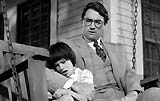
|






























